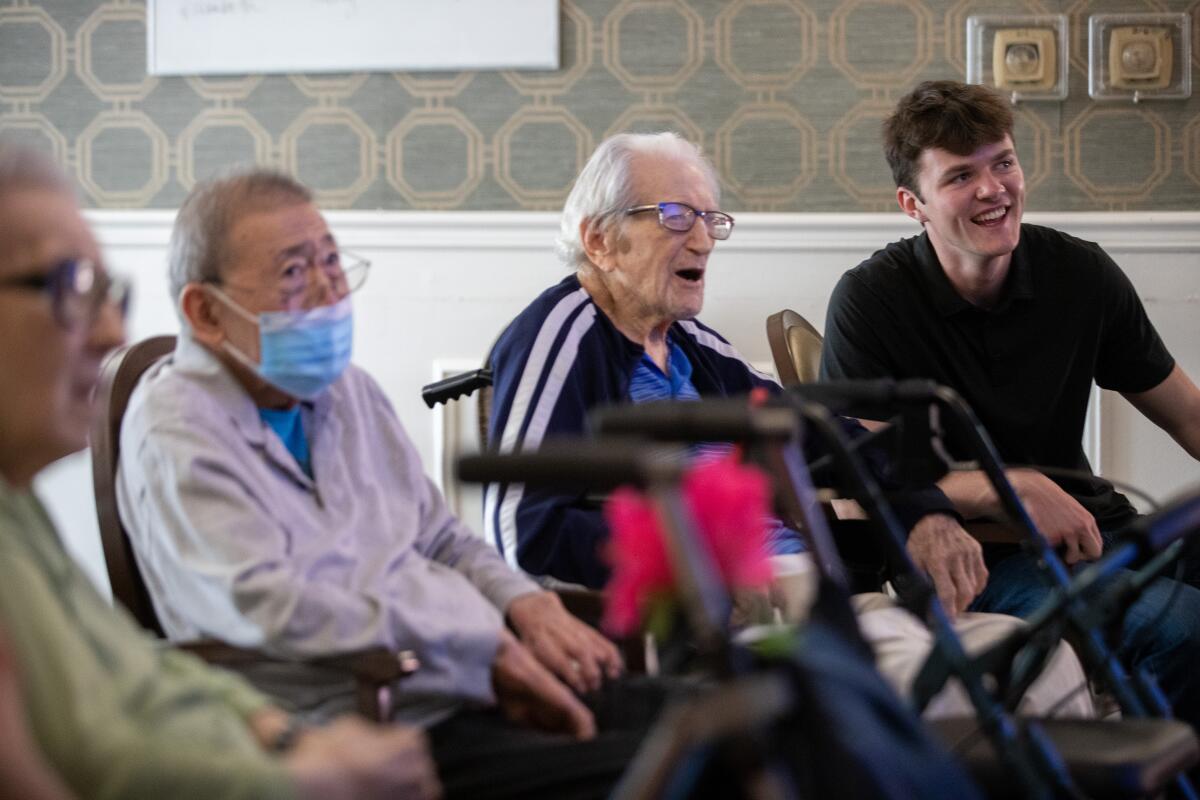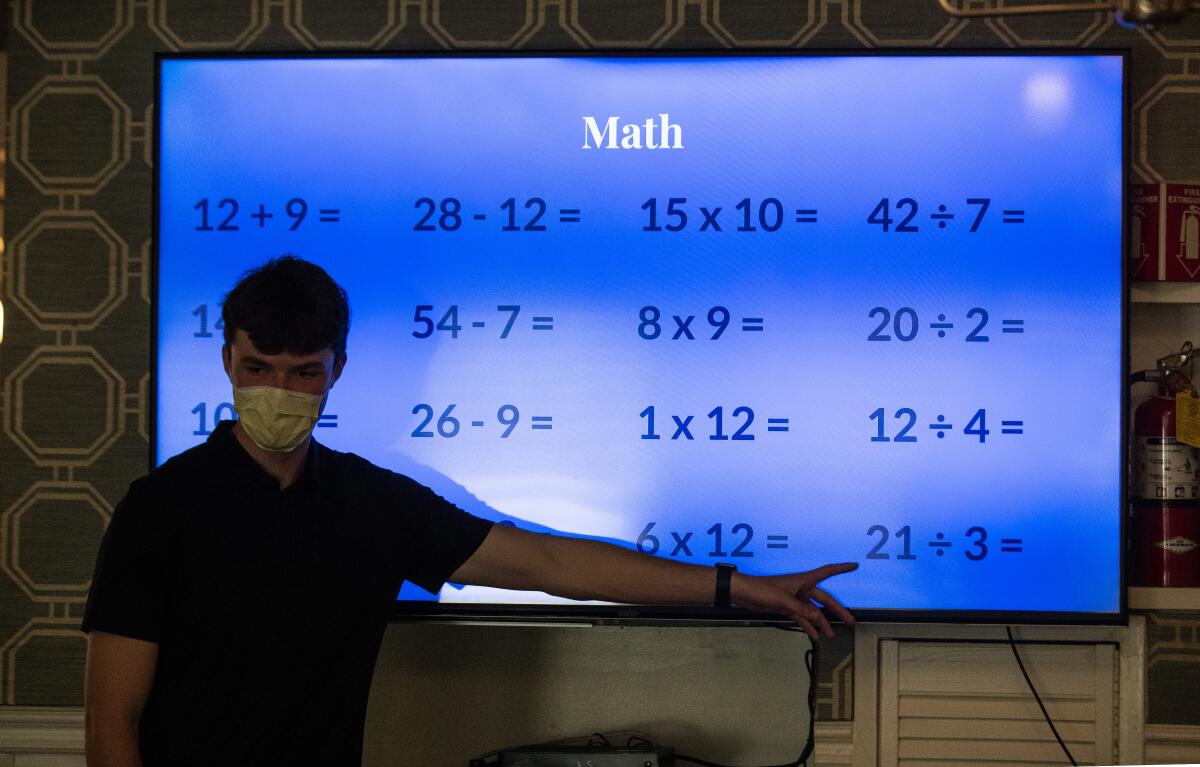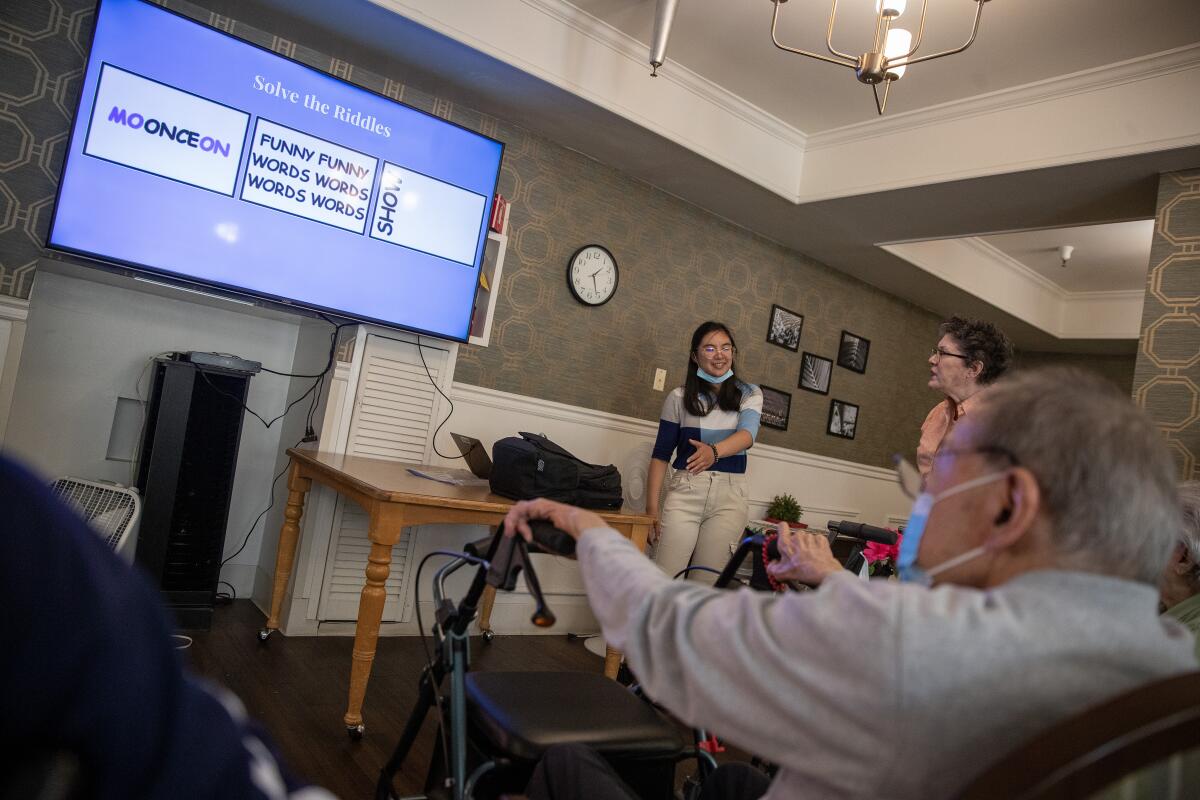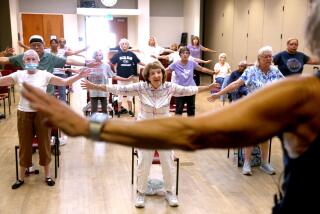Column: Answer on the tip of your tongue? Students quiz aging adults to improve brain function

- Share via
Eddie Nash, a UCLA sophomore, peered at his audience and then read the next question on the big digital screen.
“Which U.S. festival hosted over 350,000 music fans in 1969?” he asked.
Eight attentive students in their 60s and older studied the question and put their minds to work, searching for the answer as if rummaging through a closet for a missing hat.
“Oh come on, this is so easy. It’s right on the tip of my tongue,” one woman said.
There was a range of cognitive ability, from mild impairment to normal acuity, among the eight older adults who had signed up for this Saturday afternoon session of the UCLA Brain Exercise Initiative. But the answer was proving to be elusive, even though that famous concert was a soundtrack for this very generation.
California is about to be hit by an aging population wave, and Steve Lopez is riding it. His column focuses on the blessings and burdens of advancing age — and how some folks are challenging the stigma associated with older adults.
Nash, part of a group of students who visit senior living centers near campus to quiz older adults, helped out.
“The first letter is W,” he said.
“We all know what it is. We just can’t think of it,” said a woman named Nina, perfectly describing the frustration that has tormented multitudes for eons.
And then suddenly, as if a bolt of sunshine had shot through the clouds, she got it.
“Woodstock,” Nina announced. While there was a collective sigh of relief from most of the participants, one woman who couldn’t get the word past that roadblock at the tip of her tongue, acknowledged her distress, saying, “That’s embarassing.”
But as Nash — a lanky, soft-spoken young man — kept saying in a soothing and encouraging manner, there is no flunking this class, in which everyone gets an A for participation and effort.

I met Nash at the L.A. Times Festival of Books, where he worked as an author escort and told me about his volunteer work with the Brain Exercise Initiative. It’s one example of what policy makers are talking about when they refer to the value of intergenerational relationships, in which learning and socializing can be a two-way experience, and collaboration is key to tackling a host of societal challenges related to aging.
Another good example, in the San Fernando Valley, is ONEgeneration, in which an adult day-care center collaborates with a preschool. In midcity, Heart of Los Angeles has an orchestra made up of kids and retirees.
Nash, who wants to become a doctor and specialize in geriatrics, told me that when he was in high school in Thousand Oaks, he became concerned about his grandmother and other older adults who were avoiding grocery stores during the pandemic. He helped form a local chapter of a national group called Zoomers to Boomers, recruiting classmates to pick up and deliver groceries.
“We connected 200 older adults with high school kids,” said Nash, who joined the nonprofit Brain Exercise Initiative as part of a service training requirement at UCLA.
Esin Gumustekin, a second-year medical school student at UCLA, started the initiative in 2019 as an undergrad. Her grandmother had Alzheimer’s, she said, “and I was extremely close to her and saw firsthand how horrible this disease is, and how people lose their identity and sense of purpose.”
Gumustekin said there are now 80 chapters at universities in the U.S. and Canada, and the UCLA group has about four dozen student volunteers working several times a week with residents of neighborhood retirement homes. At the moment, there are more students than demand, which may be a pandemic-related problem.

The session I attended was led by Nash and UCLA premed student Nhi Pham, who worked at a long-term care facility the summer before her senior year of college and is considering geriatric medicine. She and Nash led their eight students through a series of general interest questions, riddle-solving and basic math problems.
What is the quality of an object that allows it to float on water? Name a mammal that can’t jump. What was Elvis Presley’s first big hit? Name some items that come in 12s. What is 54 minus 7, and 27 divided by 9?
Some got the answers quickly; others struggled. Nash and Pham offered clues, encouragement and congratulations, patiently waiting for each of the eight to come up with the correct answers.
The questions are different at each session, with the packages developed by Gumustekin and other students based on research by Japanese neuroscientist Ryuta Kawashami. The goal is to improve cognitive function, and the Brain Exercise Initiative website states: “We believe that through simple brain exercises … we can slow the onset of Alzheimer’s.”
That is not a widely held conviction among neuroscientists and geriatric specialists I’ve spoken to about the merits of word games, crossword puzzles and cognitive training drills. They extol the many benefits of social interaction and putting the brain to work, but they maintain that cognitive improvement may be limited to the task at hand.
For the record:
10:56 a.m. May 21, 2023An earlier version of this story misstated the name of the director of Cedars-Sinai’s Memory and Aging Program. He is Dr. Zaldy Tan.
“There is no robust evidence that cognitive training can delay or reverse dementia,” said Dr. Zaldy Tan, a Cedars-Sinai Alzheimer’s expert and director of the Memory and Aging Program.
But participating, socializing and confronting fears could improve moods and give people a better sense of confidence and well-being, Tan said, all of which are beneficial.
“I think it’s very worthwhile,” said Patty Hooper, who had the answers to quite a few questions at the session I attended. She said she has occasional “mind boggle” but no specific memory issues, and she thinks the Brain Exercise Initiative is a far better use of her time than watching television.
“I come because it’s fun,” said Larry Abe, who told me he’s having no memory issues.
Nina, who got the Woodstock answer, didn’t want to share her last name but said she increasingly struggles with the tip–of-the-tongue syndrome.
“Oh, absolutely.”
Nina said she’s careful to place her belongings in the same spot all the time so it’s easier to track them. But she is convinced the brain exercises, which she started in March, have helped.
“I know that my recall is better,” Nina said.
Gumustekin said she believes brain function is improving based on her own experience and testimonials from others. But to her, the socialization benefits are just as important. She’s seen older adults become more engaged and eager to participate, which makes it easier to forge bonds.
“It’s a two-way street,” she said, and she has valued the friendships built across generations. “We see them as our grandparents, and we look forward to going there and volunteering.”
Gumustekin said she became particularly close to a retired gynecologist who attended the sessions.
“She was really a mentor for me as I was going through more medical school requirements,” said Gumustekin. “She would always ask, ‘How are your classes? How’s organic chemistry?’”
Nash works as an undergrad research assistant at UCLA’s Drug Discovery Lab, which is searching for therapeutic cures to Alzheimer’s and other neurodegenerative disorders. Alzheimer’s is a complex disease, he said, and it may be years before suffering and death are alleviated, but that presents young people with an opportunity and a duty.
“There’s so much we can do,” Nash said. “We just have to play our role.”
More to Read
Sign up for Essential California
The most important California stories and recommendations in your inbox every morning.
You may occasionally receive promotional content from the Los Angeles Times.










